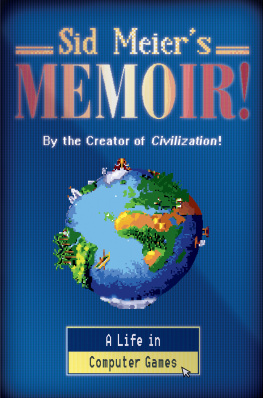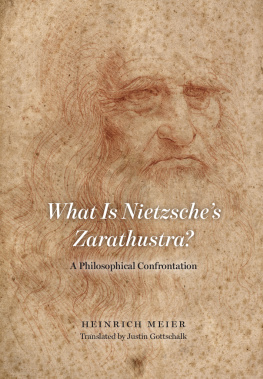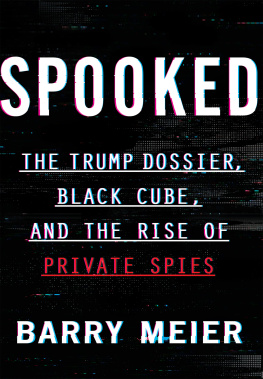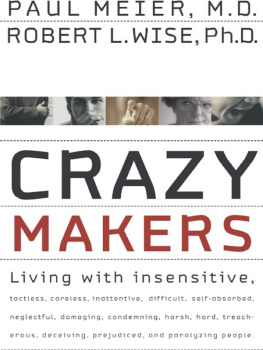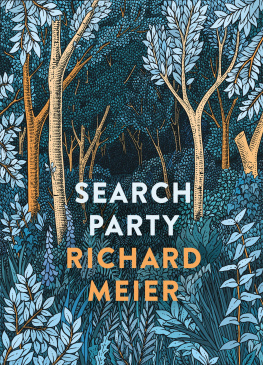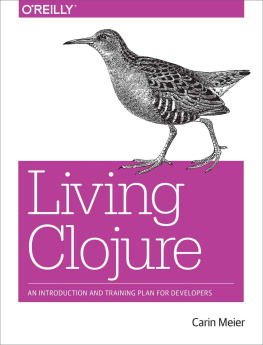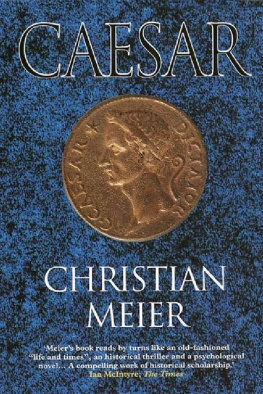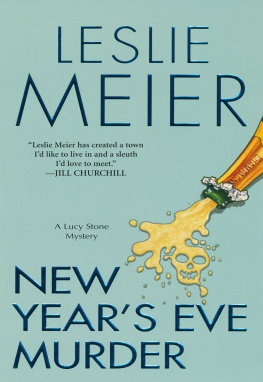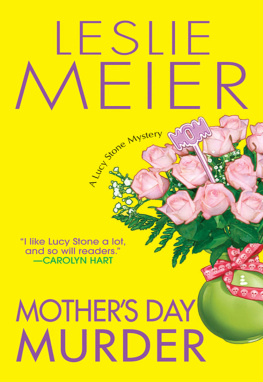Sid Meier - Sid Meiers Memoir!
Here you can read online Sid Meier - Sid Meiers Memoir! full text of the book (entire story) in english for free. Download pdf and epub, get meaning, cover and reviews about this ebook. publisher: W. W. Norton & Company, genre: Home and family. Description of the work, (preface) as well as reviews are available. Best literature library LitArk.com created for fans of good reading and offers a wide selection of genres:
Romance novel
Science fiction
Adventure
Detective
Science
History
Home and family
Prose
Art
Politics
Computer
Non-fiction
Religion
Business
Children
Humor
Choose a favorite category and find really read worthwhile books. Enjoy immersion in the world of imagination, feel the emotions of the characters or learn something new for yourself, make an fascinating discovery.
- Book:Sid Meiers Memoir!
- Author:
- Publisher:W. W. Norton & Company
- Genre:
- Rating:4 / 5
- Favourites:Add to favourites
- Your mark:
- 80
- 1
- 2
- 3
- 4
- 5
Sid Meiers Memoir!: summary, description and annotation
We offer to read an annotation, description, summary or preface (depends on what the author of the book "Sid Meiers Memoir!" wrote himself). If you haven't found the necessary information about the book — write in the comments, we will try to find it.
Sid Meiers Memoir! — read online for free the complete book (whole text) full work
Below is the text of the book, divided by pages. System saving the place of the last page read, allows you to conveniently read the book "Sid Meiers Memoir!" online for free, without having to search again every time where you left off. Put a bookmark, and you can go to the page where you finished reading at any time.
Font size:
Interval:
Bookmark:


Sid Meiers
MEMOIR!


A Life in
Computer Games


Sid Meier
written with Jennifer Lee Noonan

W. W. NORTON & COMPANY
Independent Publishers Since 1923
To the worldwide community of computer, console, and mobile gamers (and their long-suffering spouses, parents, and significant others).
Sid Meiers
MEMOIR!
A BILLION HOURS AGO, Neanderthals were making spearheads in the Stone Age. A billion hours from now, it will be the year 116,174 AD, assuming the calendar system holds up that long. With a billion hours to play with, you could make roughly 13,000 round trips to Alpha Centauri at the speed of light, or play a back-to-back marathon of every Star Trek movie ever made for every person in New York... twice.
Or, you could spend it all playing Sid Meiers Civilization. So Im told.
One billion hours is the sort of number that is humbling to the point of incomprehensibilityand its a wildly conservative estimate, at that. The game distribution service Steam only began collecting player data in earnest within the last decade, and one billion is actually the number of hours played on Civilization V, specifically, from its release in 2010 up through 2016. A six-year window into one game in a series that (as of this printing) spans twenty-nine years and twelve editions, not to mention the expansion packs.
To imagine the hours devoted to all the incarnations of Civ since 1991 is, well, incomprehensible. I wouldnt want to try. Whats more, any fair assessment of Civs success would have to include all the other games Ive crafted along the wayincluding titles like Pirates! and Railroad Tycoon, which were popular series in their own right, but also overlooked gems like C.P.U. Bach and SimGolf. Id even want to acknowledge projects that started strong but fizzled early, because sometimes it takes a misstep to figure out where you should be headed. Each game taught me something, each game was both painful and gratifying in its own way, and each game contributed to what came after it.
What follows is a largely chronological examination of all the games Ive produced over my lifetime, from the wildly successful to the completely unheard of. Its a thorough list, including a few that were developed outside the traditional career model where you do things like make money and get sued if you copy other peoples ideas. Just as every sprawling empire can be traced back to a single settler, my reputation as a benevolent industry patriarch wasnt built in a day, and the truth is I was once a young kid who didnt know there were rules, making games out of not-so-original ideas for maximum fun and minimum (often nonexistent) profit. Fortunately, Ive been told the statute of limitations has expired, so Im ready to come clean. But whether they took a billion lines of codenot an impossible estimate for all of the Civ products combinedor less than a hundred, there is one thing every game in this book has in common. They are fundamentally comprised, as all games are, of a series of interesting decisions.
Like most sweeping definitions, this one requires a little unpacking, which Ill get into in Chapter 16. But the most important takeaway is that its a mindset that looks outward, rather than inward. We are surrounded by decisions, and therefore games, in everything we do. Interesting might be subject to personal taste to some degree, but the gift of agencythat is, the ability of players to exert free will over their surroundings rather than obediently following a narrativeis what sets games apart from other media, regardless of whether that agency is expressed through a computer keyboard, plastic tokens, physical movement, or entirely in the mind. Without a players input, there can be no game; conversely, it takes only a single interaction to transform an observer into a participant, and thus a player.
Of course, its still incumbent upon us as designers to make that decision-making enjoyable, and thats not always an easy task. I dont claim, for example, that the decision over what to have for lunch would necessarily make for a good gameonly that it has the potential to be turned into one, or at least part of one. No subject is universally boring; everything contains a core of fascination somewhere, and the primary job of a game designer is not to make something fun, but to find the fun. I have a habit (some might call it a compulsion) of analyzing how things work, examining their effects on people, and parsing out which elements are fundamentally compelling and which are just window dressing. Once you isolate the most interesting part of any given decision, then youre ready to build an interactive experience for the player that feels fascinatingly new, yet comfortingly familiar. Thats my philosophy, anyway. It seems to have worked out pretty well.
Im often asked in interviews when I got interested in games, usually with the implied hope that Ill identify a prodigiously early moment in my childhood when I suddenly knew I was a game designer. Interviewers seem especially keen to discover some talismanic object of inspirationperhaps it was the 630-page illustrated Civil War book that my father gave me in elementary school, or the train station I lived next to in Switzerland, or an Errol Flynn swashbuckling classic flickering on our tiny, black-and-white televisionand they want me to say that in that instant, I felt the flash of destiny. How else can one explain the relatively uncommon path Ive taken in life, if not in terms of sudden twists and critical junctures?
But from my perspective, there was no turning point. I never made the conscious decision to embrace gaming, because as far as I can tell gaming already is the default, straightforward path. Not only does it span a billion hours of historyancient Sumerians were throwing dice as early as 5000 BC, and cruder games almost certainly go back as far as the Neanderthalsbut its a deeply embedded human instinct. A newborn baby will play tug-of-war with its own foot before it even understands who the foot belongs to. Everyone starts out life as a gamer, and I was no different. First, I laughed at peekaboo, then I lined up toy soldiers, then I played board games, then I made fun computer programs. To me, it seems like the most logical progression in the world. The question When did you start? would be better framed as Why didnt you stop?but even then, I wont have a good answer. I find it mind-boggling that a life spent dedicated to gaming is the exception, rather than the rule.
If my gravestone reads Sid Meier, creator of Civilization and nothing else, Ill be fine with that. Its a good game to be known for, and Im proud of the positive impact its had on so many players lives. But it wont be the whole story.
This is the whole story.
Achievement Unlocked: A Journey of 1,000 MilesRead one page.


Hellcat Ace
Next pageFont size:
Interval:
Bookmark:
Similar books «Sid Meiers Memoir!»
Look at similar books to Sid Meiers Memoir!. We have selected literature similar in name and meaning in the hope of providing readers with more options to find new, interesting, not yet read works.
Discussion, reviews of the book Sid Meiers Memoir! and just readers' own opinions. Leave your comments, write what you think about the work, its meaning or the main characters. Specify what exactly you liked and what you didn't like, and why you think so.

